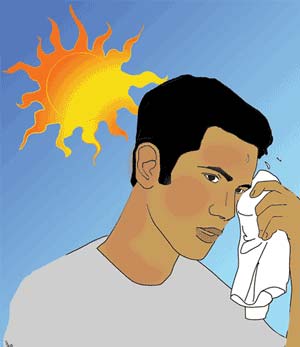Is it too cold outside? Too hot? Are you hungry? Are you tired? Is the corner store too far to walk to? Do you essentially take the path of least resistance at every decision point in every day of your life? This approach is probably disturbing your health. Your body’s resilience to environmental encroachment maintains its integrity by being exposed to environmental encroachment. It seems too simple a matter to even mention, but less apparent is that the opposite is true, and, I will repeat myself: if you seek to avoid the relative discomfort of environmental encroachment, your body will lose the ability withstand any changes in the environment. At a cellular level, your body’s robustness is a result of simply asking it to be robust.

Have you ever wondered how people did not suffer before air conditioning and central heating; before roads and gas stations; before, dare I ask… smart phones? Folks were at the whim of natural variations. Imagine the wintertime. Patches of snow spot the terrain outside of your window, near to here you are sitting comfortable, reading on your Kindle. Perhaps the draft from an older window in your home drops the temperature just a bit, and it is that time just before the furnace kicks on to move some warmer air into the room. You have been sitting idle for some time, and just then, you feel cold. It almost kind of burns—an odd sensation from the lack of heat—while your skin puckers up with goose bumps, trying to keep out the cold. Maybe you experience a lightening bolt sort of sensation down your back as your muscle involuntarily contract resulting in a shiver. In that moment, the environment—the cooler temperature of the air surrounding your body—is asking, no demanding, your attention. Two degrees higher and perhaps three minutes ago, you knew nothing of the impending assault on your body and mind. What is this experience anyway? The body is generating heat such that a temperature test would read about 98 degrees F or 37 degrees C. Why is the surrounding air of 72 degrees F causing this onslaught of painful misery? Why did is not occur at 73 degrees? Why does it also not occur sometimes when it is much colder?
 When this happens to me, I often think about the robust individuals of years past, traversing the continental United States from East to West in nothing but covered wagons or on horseback, exposed to the natural elements with no recourse if the situation grows even more sour. Sub-zero temperatures seem to offer no boundaries to pioneering individuals while a rather warmed room of shelter is causing such a painful reaction from my body. Sensations. Feeling cold. Feeling hot. Feeling hungry. Feeling tired. Feeling the need to breathe. Communication from your mind to your brain, via your body; compelling you to act; seemingly, in your best interest. Act you will, trying to remove even the slightest sensation of discomfort by using conditioned responses: for cold, turn up the heater; for hunger, eat, and so forth. As you do so, you cause future sensations to grow more or less intense in response to the same environmental signal. For the easy example I have been banging away at: the temperature drops a bit, causing the above described sensations, and you run and increase the temperature on the thermostat, kicking on the furnace and releasing warm air into the room. The sensation of “cold” quickly disappears, for the moment; but what has just happened is that you communicated to your mind that respite is always near. Your mind, in turn, will reset the cue to signal to you that it is too cold to just an infinitesimally small degree of difference so that next time, you feel the sensations of cold at a warmer temperature. This is a most important point; and this effect occurs over a wide range of phenomena; and it changes your physiology.
When this happens to me, I often think about the robust individuals of years past, traversing the continental United States from East to West in nothing but covered wagons or on horseback, exposed to the natural elements with no recourse if the situation grows even more sour. Sub-zero temperatures seem to offer no boundaries to pioneering individuals while a rather warmed room of shelter is causing such a painful reaction from my body. Sensations. Feeling cold. Feeling hot. Feeling hungry. Feeling tired. Feeling the need to breathe. Communication from your mind to your brain, via your body; compelling you to act; seemingly, in your best interest. Act you will, trying to remove even the slightest sensation of discomfort by using conditioned responses: for cold, turn up the heater; for hunger, eat, and so forth. As you do so, you cause future sensations to grow more or less intense in response to the same environmental signal. For the easy example I have been banging away at: the temperature drops a bit, causing the above described sensations, and you run and increase the temperature on the thermostat, kicking on the furnace and releasing warm air into the room. The sensation of “cold” quickly disappears, for the moment; but what has just happened is that you communicated to your mind that respite is always near. Your mind, in turn, will reset the cue to signal to you that it is too cold to just an infinitesimally small degree of difference so that next time, you feel the sensations of cold at a warmer temperature. This is a most important point; and this effect occurs over a wide range of phenomena; and it changes your physiology.
When you instantly seek comfort, always and constantly, cellular function changes such that you grow less resilient. Smaller environmental changes now cause a greater response in sensation. To keep with our example, you will feel colder at higher and higher temperatures. This lost of robustness over many different signals is a decline in your health. To regain health, integrity, and robustness you must start to get comfortable with being a little uncomfortable. It requires mental focus, but it will move the needle in the direction you need it to. As your health improves, you will be less hungry, less cold, less infections will grab hold of you less often; you will breathe less, you will want less, you will consume less, your physiological and psychological function will improve, you will experience pain and hurt less; and very likely, you will find peace. All from progressively experiencing a bit of discomfort… feeling alive.
